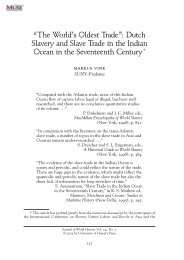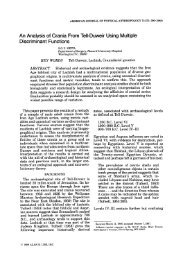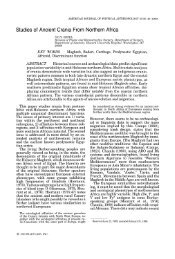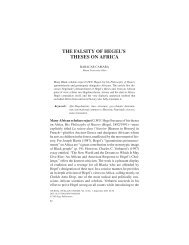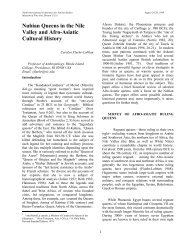- Page 1 and 2: THE MILITARY SYSTEM OF BENIN KINGDO
- Page 3 and 4: DECLARATIONI, Osarhieme Benson Osad
- Page 5 and 6: DEDICATIONTo my childrenOsayomwanbo
- Page 7 and 8: 3.7 Intelligence and Logistics .. .
- Page 9 and 10: MAPS, CHARTS AND FIGURES1. Map 1: B
- Page 11 and 12: Hamburg for the grants for final wr
- Page 13 and 14: CHAPTER ONE________________________
- Page 15 and 16: points: First, although much is kno
- Page 17 and 18: Nonetheless, writers are still inte
- Page 19 and 20: formation, also attempted to interp
- Page 21 and 22: second factor was the penetration o
- Page 23 and 24: though not necessarily the most imp
- Page 25 and 26: theory held by the historian, has d
- Page 27 and 28: forward in the 1950s and 1960s dwin
- Page 29: esearch on the more remote Ogiso pe
- Page 33 and 34: surrounding villages. Attempts at t
- Page 35 and 36: institutions, organisation and reso
- Page 37 and 38: First, that every military system h
- Page 39 and 40: elationship between warfare and the
- Page 41 and 42: in part from colonial experience, a
- Page 43 and 44: Notwithstanding the methodological
- Page 45 and 46: The indigenous knowledge system of
- Page 47 and 48: traditionsl has been the need to mo
- Page 49 and 50: Udo. This Portuguese military assis
- Page 51 and 52: The evidence were weighed and the o
- Page 53 and 54: historians cannot even begin their
- Page 55 and 56: founding of social and political in
- Page 57 and 58: have been reconsidered in this chap
- Page 59 and 60: dynamics of state formation process
- Page 61 and 62: Not much is known of the pre-Ogiso
- Page 63 and 64: knowledge based on oral traditions,
- Page 65 and 66: egan call the area Ubini. 15 A Beni
- Page 67 and 68: fourth, an Ile-Ife origin of the pr
- Page 69 and 70: integration of the large political
- Page 71 and 72: their religion, history, government
- Page 73 and 74: This is not to deny the fact that t
- Page 75 and 76: principles to which political power
- Page 77 and 78: Development of Politico-Military Id
- Page 79 and 80: millennium with the integration of
- Page 81 and 82:
forbidden by Ere’ and at once, pe
- Page 83 and 84:
the other hand, the Edionnisen led
- Page 85 and 86:
Among the writers who have studied
- Page 87 and 88:
with their ‘village sovereignty
- Page 89 and 90:
as its rise. With the restoration o
- Page 91 and 92:
The evidence from Benin military hi
- Page 93 and 94:
CHAPTER THREE______________________
- Page 95 and 96:
he was bound to take the advice of
- Page 97 and 98:
The re-organisation of the structur
- Page 99 and 100:
domestic economy, in wars of conque
- Page 101 and 102:
Ryder argues that the “upheaval b
- Page 103 and 104:
continued with the policy of consol
- Page 105 and 106:
leadership in Benin was determined
- Page 107 and 108:
Oba. 57 Although ties existed betwe
- Page 109 and 110:
their role, the military establishm
- Page 111 and 112:
At the end of the sixteenth century
- Page 113 and 114:
1440 when the state was reorganised
- Page 115 and 116:
withdrawing occasionally from state
- Page 117 and 118:
Command Structure of Benin Army, 14
- Page 119 and 120:
federation of villages organised th
- Page 121 and 122:
state. The weapons produced enabled
- Page 123 and 124:
Figure 2: The Queen Mother (Iyoba)
- Page 125 and 126:
Figure 4: A Benin warrior with Flin
- Page 127 and 128:
The weapons of war and the methods
- Page 129 and 130:
what to do. Although the conditions
- Page 131 and 132:
logistics had a function to perform
- Page 133 and 134:
task.” 145 Third, confronted with
- Page 135 and 136:
In a work published in 1668, Olfert
- Page 137 and 138:
CHAPTER FOUR_______________________
- Page 139 and 140:
period has been examined within the
- Page 141 and 142:
Warfare, Warriors and the Slave Tra
- Page 143 and 144:
abandonment of Oyo claims in the ar
- Page 145 and 146:
during this period is strong eviden
- Page 147 and 148:
whose head was sent to the Oba of B
- Page 149 and 150:
In an era in which the ruling class
- Page 151 and 152:
In the first half of the seventeent
- Page 153 and 154:
king. 78 In spite of the problems b
- Page 155 and 156:
espects, which provided the basis f
- Page 157 and 158:
Chief was Ogina during the reign of
- Page 159 and 160:
The Osuma, who was fourth in the hi
- Page 161 and 162:
long-range effect had been politica
- Page 163 and 164:
One account claims that both Ehennu
- Page 165 and 166:
Members of the War Council 1600-180
- Page 167 and 168:
The Oba's Security Council1600-1800
- Page 169 and 170:
at the end of the seventeenth centu
- Page 171 and 172:
In establishing a new guild to atte
- Page 173 and 174:
Figure 6: A Benin warrior in a war
- Page 175 and 176:
Figure 8: Benin art work showing a
- Page 177 and 178:
adhere to methods used in a past ca
- Page 179 and 180:
1800, and the military system was m
- Page 181 and 182:
CHAPTER FIVEBENIN MILITARY SYSTEM D
- Page 183 and 184:
two eldest sons of the assassinated
- Page 185 and 186:
social structure of the Benin socie
- Page 187 and 188:
chiefs were apprehensive of the imp
- Page 189 and 190:
series of revolts within the empire
- Page 191 and 192:
eturn journey to Benin. They were c
- Page 193 and 194:
chiefdoms in the north. During this
- Page 195 and 196:
society. It may have responded firs
- Page 197 and 198:
The Iyase of Benin, 1700-1897The Of
- Page 199 and 200:
Benin Army in the Akure campaign; t
- Page 201 and 202:
military leaders in Benin City. Thi
- Page 203 and 204:
Benin War Council in the Nineteenth
- Page 205 and 206:
Surveillance and CollaborationThe m
- Page 207 and 208:
internal security are lacking due t
- Page 209 and 210:
the nineteenth century in Yorubalan
- Page 211 and 212:
The interest of the Oba in the mili
- Page 213 and 214:
victory. This can be interpreted to
- Page 215 and 216:
the nineteenth century, which final
- Page 217 and 218:
In doing this, this chapter also di
- Page 219 and 220:
Ovonramwen. 11 For the purpose of t
- Page 221 and 222:
The contents of this treaty suggest
- Page 223 and 224:
From the foregoing, Phillip’s dis
- Page 225 and 226:
of kernels which were in demand in
- Page 227 and 228:
seems to be that Phillips was going
- Page 229 and 230:
not wait because he had so much wor
- Page 231 and 232:
The nature and character of the Bri
- Page 233 and 234:
of the command problem was such tha
- Page 235 and 236:
ush.’ 82 On 18 February 1897, the
- Page 237 and 238:
force that invaded Benin was not a
- Page 239 and 240:
Guerrilla Warfare after the Fall of
- Page 241 and 242:
British conquest and the establishm
- Page 243 and 244:
The guerrilla war completely disrup
- Page 245 and 246:
CHAPTER SEVEN______________________
- Page 247 and 248:
eaching campaigns which extended vi
- Page 249 and 250:
to the debate appears to be quite u
- Page 251 and 252:
Benin. Over the centuries, Benin’
- Page 253 and 254:
was not a mere figurehead but a pol
- Page 255 and 256:
similar, the erudition of each writ
- Page 257 and 258:
30052 Idanre District of Ondo Provi
- Page 259 and 260:
Chief of Southern NigeriaTreaties:C
- Page 261 and 262:
List of InformantsSerialNo.Name Occ
- Page 263 and 264:
Ibadan, 1967.Awe, B. A.Babayemi, S.
- Page 265 and 266:
Ijoma, J. O. “The History of the
- Page 267 and 268:
Adegbola, E. A. A. (ed.) Traditiona
- Page 269 and 270:
Ben-Amos, D.“Animals in Edo Visua
- Page 271 and 272:
Bradbury, R. E.“Continuities and
- Page 273 and 274:
African Journal of Archaeology 6, 1
- Page 275 and 276:
Hopkins, A. G.“European Expansion
- Page 277 and 278:
Law, R. C. C.Lloyd, P. C.Lloyd, P.
- Page 279 and 280:
Kingdom of Benin,” Tribus 45, 199
- Page 281 and 282:
Wescott, R. W.“Ancient Egypt and
- Page 283 and 284:
Ben-Amos, Girshick P.The Art of Ben
- Page 285 and 286:
Davidson, B.The lost Cities of Afri
- Page 287 and 288:
Egharevba, J. U. Okha Edo. Lagos: C
- Page 289 and 290:
Educational Books Nigeria Ltd., 198
- Page 291 and 292:
Matthews, NoelMaurice, F.Morgan, Ga
- Page 293 and 294:
Shinnie, M. Ancient African Kingdom



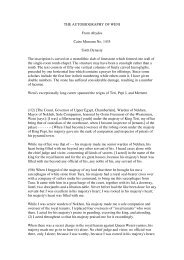
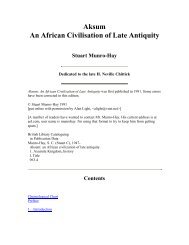
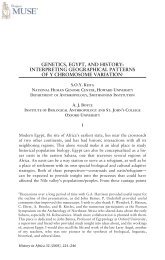

![The Negro trail blazers of California [microform] : a ... - Homestead](https://img.yumpu.com/32436613/1/174x260/the-negro-trail-blazers-of-california-microform-a-homestead.jpg?quality=85)
